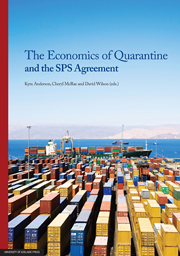Book contents
- Frontmatter
- Contents
- List of tables, figures and boxes
- Acronyms
- Preface
- List of contributors
- 1 Introduction
- PART I The multilateral rules under WTO
- PART II The ‘appropriate level of protection’
- 6 Appropriate level of protection: a European perspective
- 7 Appropriate level of protection: an Australian perspective
- 8 Appropriate level of protection: a New Zealand perspective
- 9 Beyond iso-risk to include benefits under the SPS Agreement
- 10 Integrating import risk and trade benefit analysis
- PART III Adding more economics to risk analysis
- PART IV Specific health and environmental risks from trade
- PART V Conclusion
- APPENDIX The legal text of the SPS Agreement
10 - Integrating import risk and trade benefit analysis
from PART II - The ‘appropriate level of protection’
Published online by Cambridge University Press: 05 June 2013
- Frontmatter
- Contents
- List of tables, figures and boxes
- Acronyms
- Preface
- List of contributors
- 1 Introduction
- PART I The multilateral rules under WTO
- PART II The ‘appropriate level of protection’
- 6 Appropriate level of protection: a European perspective
- 7 Appropriate level of protection: an Australian perspective
- 8 Appropriate level of protection: a New Zealand perspective
- 9 Beyond iso-risk to include benefits under the SPS Agreement
- 10 Integrating import risk and trade benefit analysis
- PART III Adding more economics to risk analysis
- PART IV Specific health and environmental risks from trade
- PART V Conclusion
- APPENDIX The legal text of the SPS Agreement
Summary
Economists have long emphasised the gains from international trade, but have acknowledged that there can be external diseconomies, including pest and disease risks, associated with importing plant and animal products. The General Agreement on Tariffs and Trade (GATT), both in the original 1947 version and in the 1994 World Trade Organization (WTO) extension of it, follows this lead, with the general rules constraining trade barriers and facilitating their reduction, but with allowance for exceptions, such as for quarantine purposes.
Quarantine scientists and administrators, environmentalists, and farmers facing threats, competitive and pestiferous, from imports, tend to emphasise the risks to production and the environment from trading, rather than the gains to consumers from imported products. This attitude is reflected in the WTO Agreement on the Application of Sanitary and Phytosanitary Measures (SPS Agreement). The emphasis of the SPS Agreement is on the determination of risks from plant and animal imports, the appropriate level of protection against these risks, and securing consistent application of these criteria across similar products and from similar sources. There is little if any scope for distinguishing between products with similar risk according to the level of consumer benefit which would accrue if the products were to be imported. Nevertheless the SPS Agreement is written as an “exception” to the general rules of GATT 1994.
Some economists have called for more recognition of the gains from trade - in particular the gains to consumers from imported products - in the application of quarantine laws. A few recent studies have provided estimates of these gains and have shown that the benefits of trade exceed expected costs due to pest risks in certain cases (e.g. James and Anderson 1998, and Chapter 11 in this volume by Orden, Narrod and Glauber).
- Type
- Chapter
- Information
- The Economics of Quarantine and the SPS Agreement , pp. 174 - 180Publisher: The University of Adelaide PressPrint publication year: 2012



